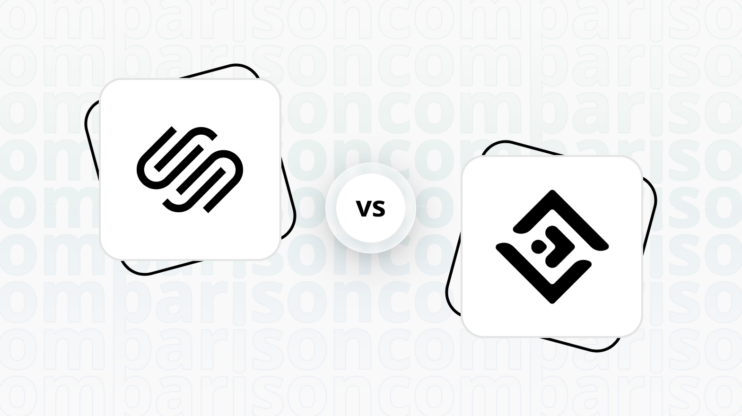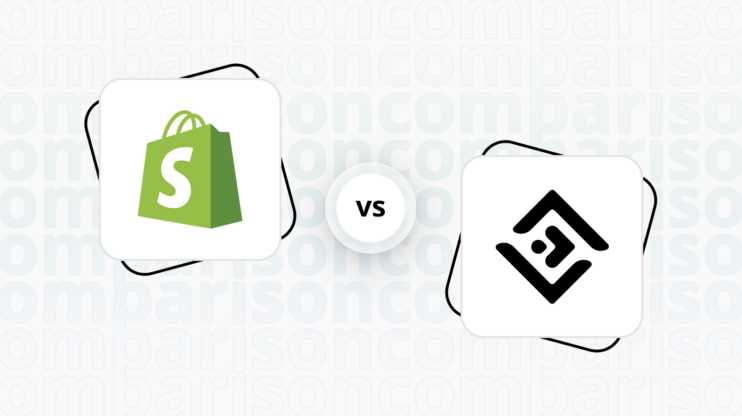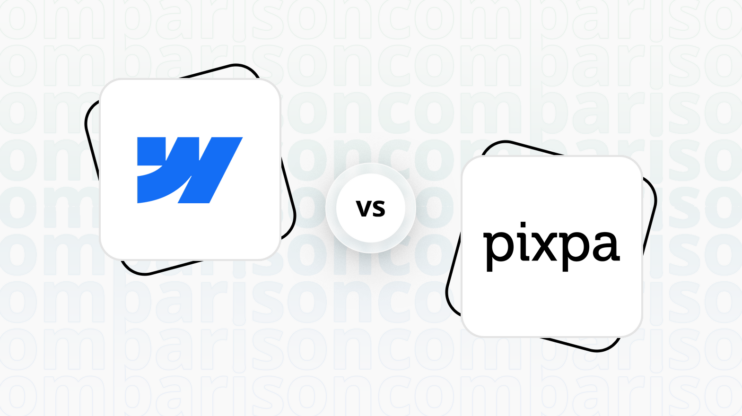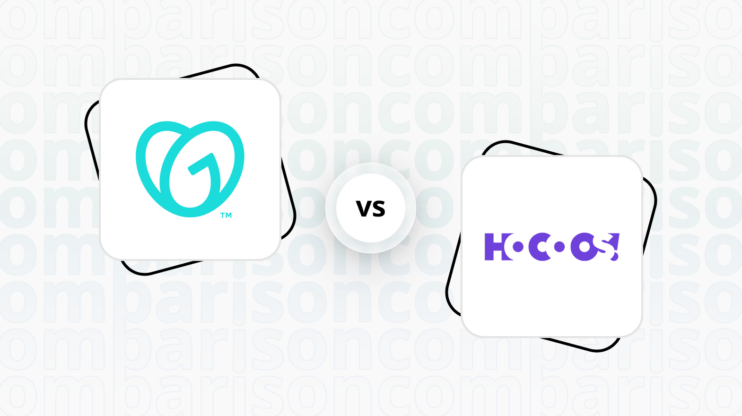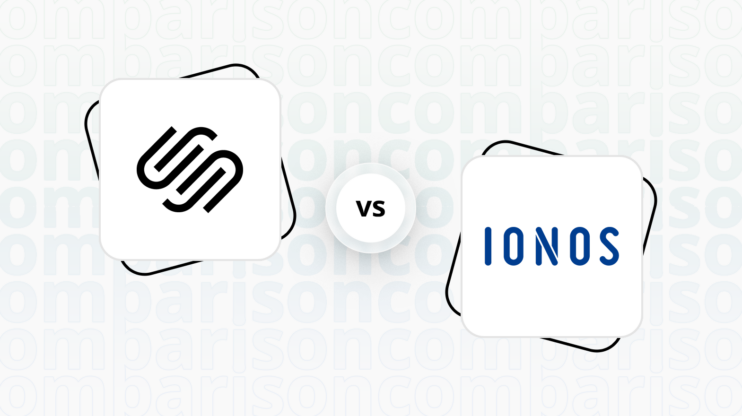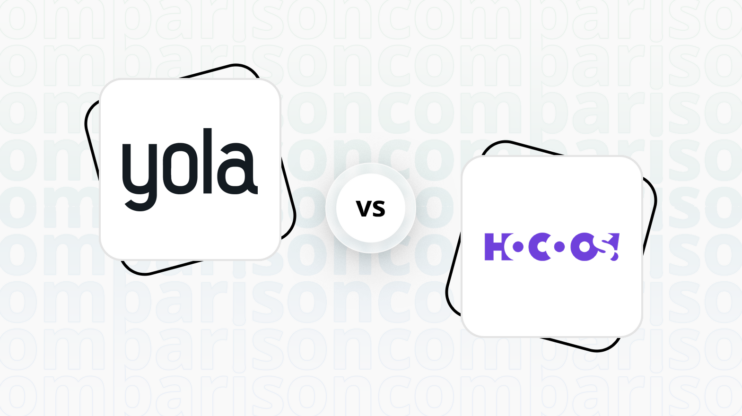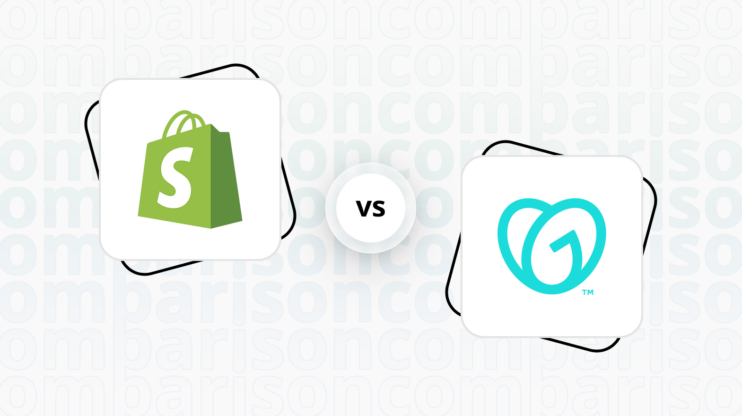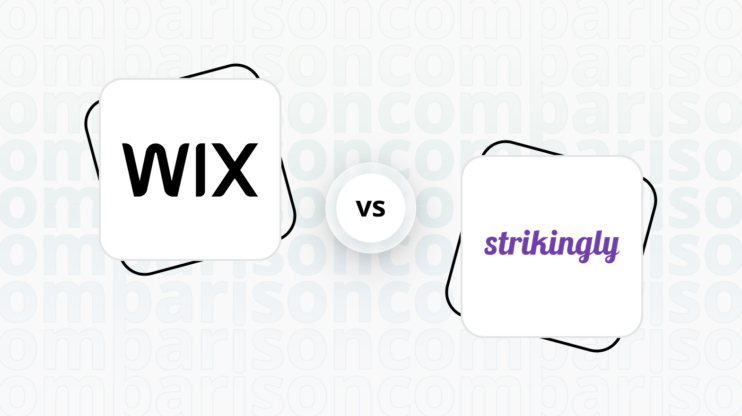Final verdict
Shopify and Squarespace both offer compelling features for different types of users, with Shopify slightly leading in overall score.
-
Shopify (Overall Grade: 8.1/10)
excels as an ecommerce powerhouse, offering a comprehensive suite of tools for online store management, including advanced inventory management, a wide range of payment gateways, and extensive app integrations. It’s designed for businesses looking to scale, providing robust marketing tools and analytics. Shopify’s platform is slightly more complex, catering to users who prioritize ecommerce functionality over simplicity. -
Squarespace (Overall Grade: 7.9/10)
shines with its user-friendly design and aesthetic appeal, making it ideal for creatives, small businesses, and users who prioritize ease of use and design over advanced ecommerce features. Squarespace offers a more straightforward approach to website building, with beautiful templates and a simpler editor. It’s a great choice for users seeking a balance between functionality and design elegance.

|

|
|
|---|---|---|
|
Design Functionalities & Templates |
8.2 |
8.0 |
|
Ease of Use |
7.5 |
8.3 |
|
Ecommerce |
9.2 |
8.2 |
|
Website Editors |
7.9 |
8.3 |
|
Product Testing Options |
8.1 |
7.4 |
|
Price |
8.2 |
8.4 |
|
Hosting Quality |
9.0 |
7.6 |
|
Website Speed Optimization |
7.8 |
6.7 |
|
Plugins and Integrations |
8.7 |
6.8 |
|
Marketing Features |
8.8 |
8.1 |
|
Customer Support |
8.6 |
7.8 |
|
Security |
9.0 |
8.8 |
|
AI Capabilities |
7.9 |
7.5 |
|
User Management |
6.5 |
7.4 |
| Overall |
8.1 |
7.9 |
Best for ecommerce
 9.2
9.2
 8.2
8.2
Verdict
: Shopify shines for businesses aiming for growth with its extensive ecommerce features, while Squarespace caters well to those prioritizing design and simplicity.
-
Shopify
: With a score of 9.2, Shopify stands out for its robust ecommerce capabilities, making it ideal for businesses looking to scale. It offers a wide array of features from advanced inventory management to multi-channel selling. -
Squarespace
: Scoring 8.2, Squarespace is known for its user-friendly interface and beautiful templates, making it a great choice for businesses that value design and ease of use, though it may not offer the same level of ecommerce functionality as Shopify.
Best for informational & business websites
 6.8
6.8
 8.4
8.4
Verdict
: Squarespace outshines Shopify for informational and business websites, offering superior design flexibility, ease of use, and a more suitable feature set for non-ecommerce purposes.
-
Shopify
: While Shopify excels in ecommerce, its focus and features are not as well-suited for purely informational or business websites. Its score of 6.8 reflects this, indicating that while possible, creating a non-ecommerce site with Shopify might not leverage the platform’s strengths effectively. -
Squarespace
: Scoring 8.4, Squarespace is the preferred choice for informational and business websites. Its wide range of design templates, intuitive editor, and comprehensive features cater well to creating professional and visually appealing sites. Squarespace’s platform is designed to support a variety of website types, making it more versatile for users looking to build informational or business-focused sites.
Detailed comparison
Design functionalities & templates
Design FunctionalitiesRepresents how well each platform allows for creative design and customization of websites.Score Components:
- Template Variety (30%): Range and quality of design templates.
- Customization (30%): Flexibility and options for design alterations.
- User Interface (20%): Ease and intuitiveness of the design process.
- Responsiveness (10%): Adaptability to different devices and screen sizes.
- Innovation (10%): Unique design features and tools.
 8.2
8.2
 8.0
8.0
Winner: Shopify.
If you’re looking for a platform that offers more professional and ecommerce-focused templates, Shopify is the preferred choice.
Shopify’s templates are sleek and professional, ideal for ecommerce sites. They offer a sophisticated look with a focus on online stores. While the free template selection is not large, Shopify’s premium theme store provides a variety of industry-specific options, offering advanced features for a strong brand presence.
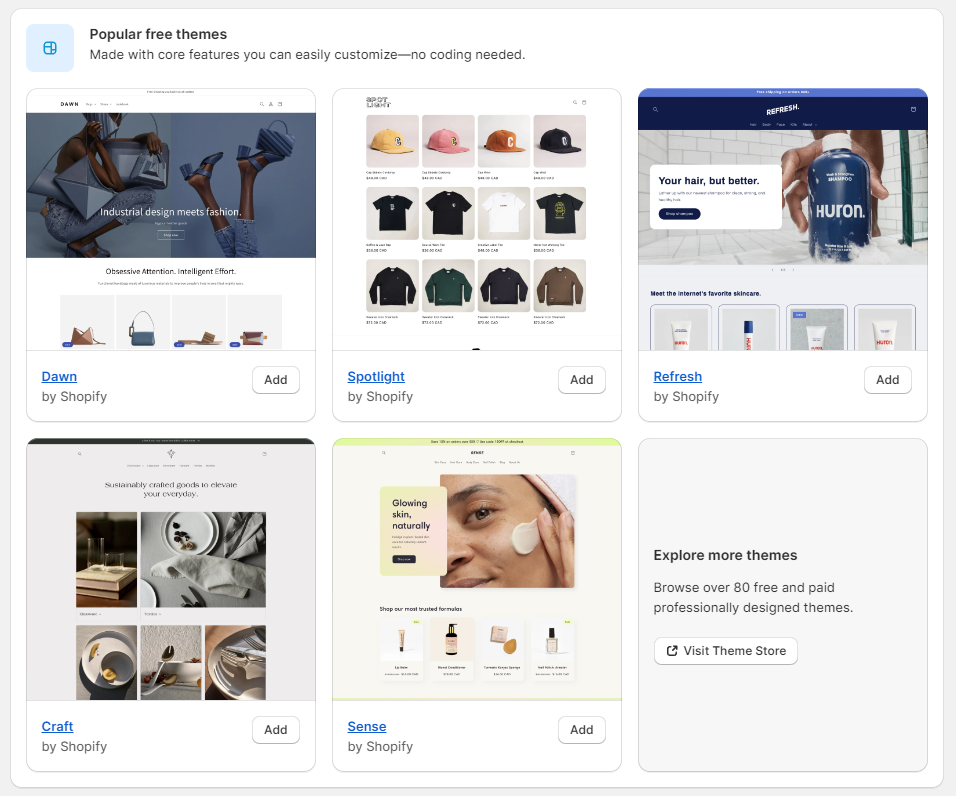
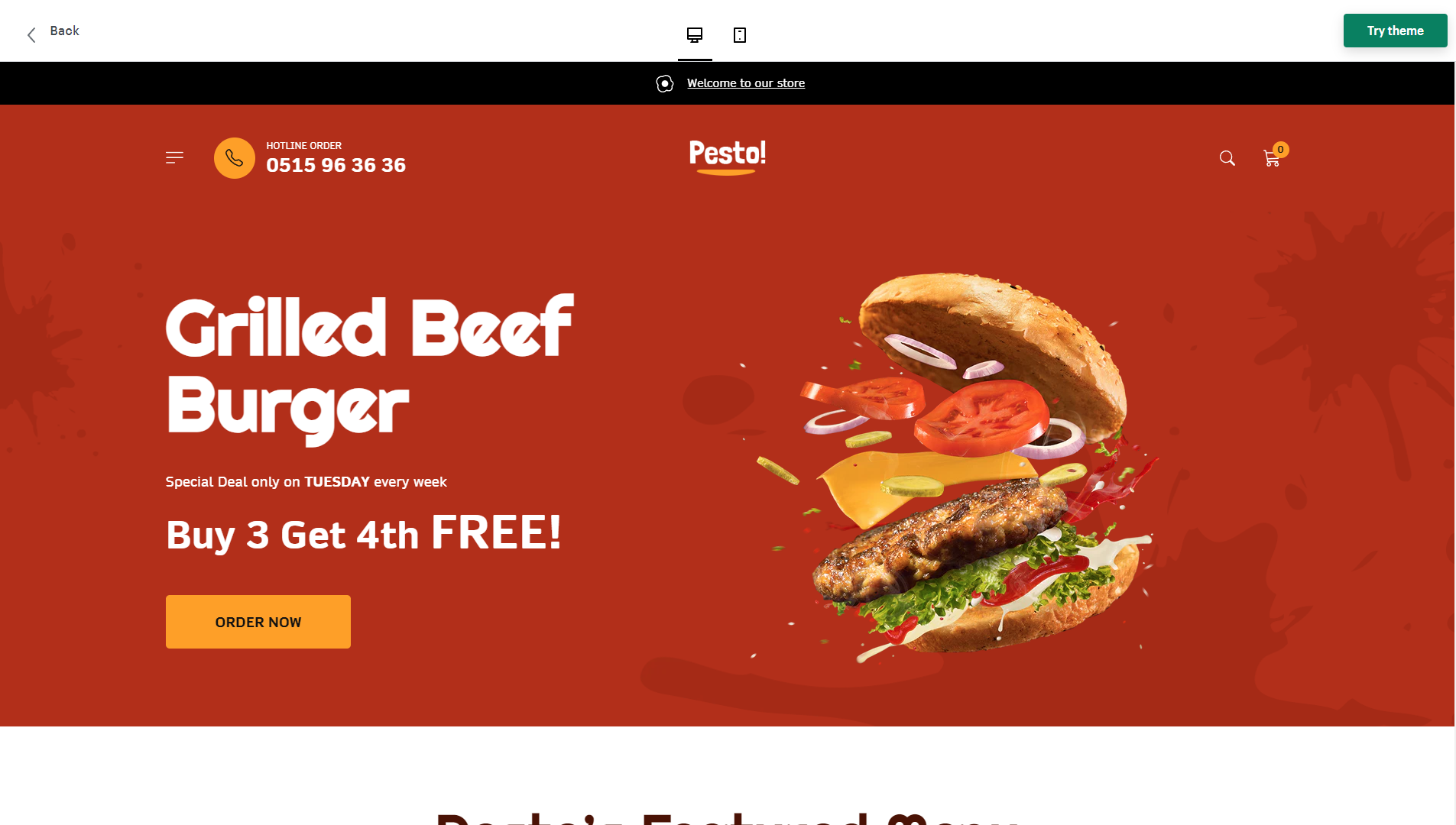
On the other hand, Squarespace boasts an impressive variety of website templates, offering over 120 pre-designed options to choose from. These templates cater to a wide range of needs and industries, from creative portfolios and sleek online stores to professional business websites and personal blogs.


Get a head start on website creation with AI
Create a custom website tailored to your business needs 10X faster with 10Web AI Website Builder!
Ease of use
Ease of useReflects the platform’s overall user-friendliness.Score
Components:
- Learning curve (40%): Quickness and ease of getting started.
- Interface design (30%): Simplicity and intuitiveness of layout.
- User guidance (20%): Quality of tutorials and support.
- Flexibility (10%): Adaptability to various user skills.
 7.5
7.5
 8.3
8.3
🏆 Winner: Squarespace
. With a score of 8.3, Squarespace is known for its user-friendly interface and straightforward navigation, making it a great choice for those seeking a hassle-free website creation experience. Shopify, scoring 7.5, also offers a robust platform but with a steeper learning curve, especially for those new to ecommerce.
Learning Resources
🏆 Winner: Squarespace
. Both platforms offer solid learning resources, but Squarespace goes a step further with its comprehensive Help Center, clear video tutorials, live webinars, an informative blog, and an active community forum. This ensures a varied and accessible learning experience for users of all levels.
For ecommerce
EcommerceMeasures the platform’s effectiveness in supporting online business activities.Score Components:
- Ecommerce themes and templates (20%): Variety and design of templates.
- Product management (25%): Ease of managing and organizing products.
- Payment options (25%): Variety and convenience of payment methods.
- Ecommerce features (20%): Features for managing an ecommerce store.
- Integration (10%): Compatibility with external e-commerce tools and services.
 9.2
9.2
 8.2
8.2
Shopify and Squarespace both offer robust ecommerce solutions, but they cater to different needs. Shopify, with a score of 9.2, is a leading ecommerce platform providing a comprehensive set of features for online businesses. It’s ideal for businesses that require advanced inventory management and multi-channel selling. Squarespace, scoring 8.2, is a user-friendly ecommerce solution that simplifies online store setup with an intuitive interface and customizable templates. It’s a good fit for businesses that value secure payment processing, built-in marketing tools, and SEO optimization.

|

|
|
|---|---|---|
|
Ecommerce themes and templates |
8.2 |
7.5 |
|
Product page customization |
8.5 |
7.0 |
|
Payment processing and commissions |
8.8 |
7.8 |
|
POS capabilities |
8.1 |
6.5 |
|
Payment gateways |
9.5 |
7.5 |
|
Product numbers |
9.0 |
6.8 |
|
Additional ecommerce features |
9.1 |
7.2 |
Shopify ecommerce features:
- Comprehensive store builder
- Shopify Payments and other gateways
- Advanced inventory management
- Multi-channel selling
- Abandoned cart recovery
- Detailed analytics and reporting
Squarespace ecommerce features:
- Intuitive interface
- Secure payment processing
- Built-in marketing tools
- SEO optimization
- Website analytics
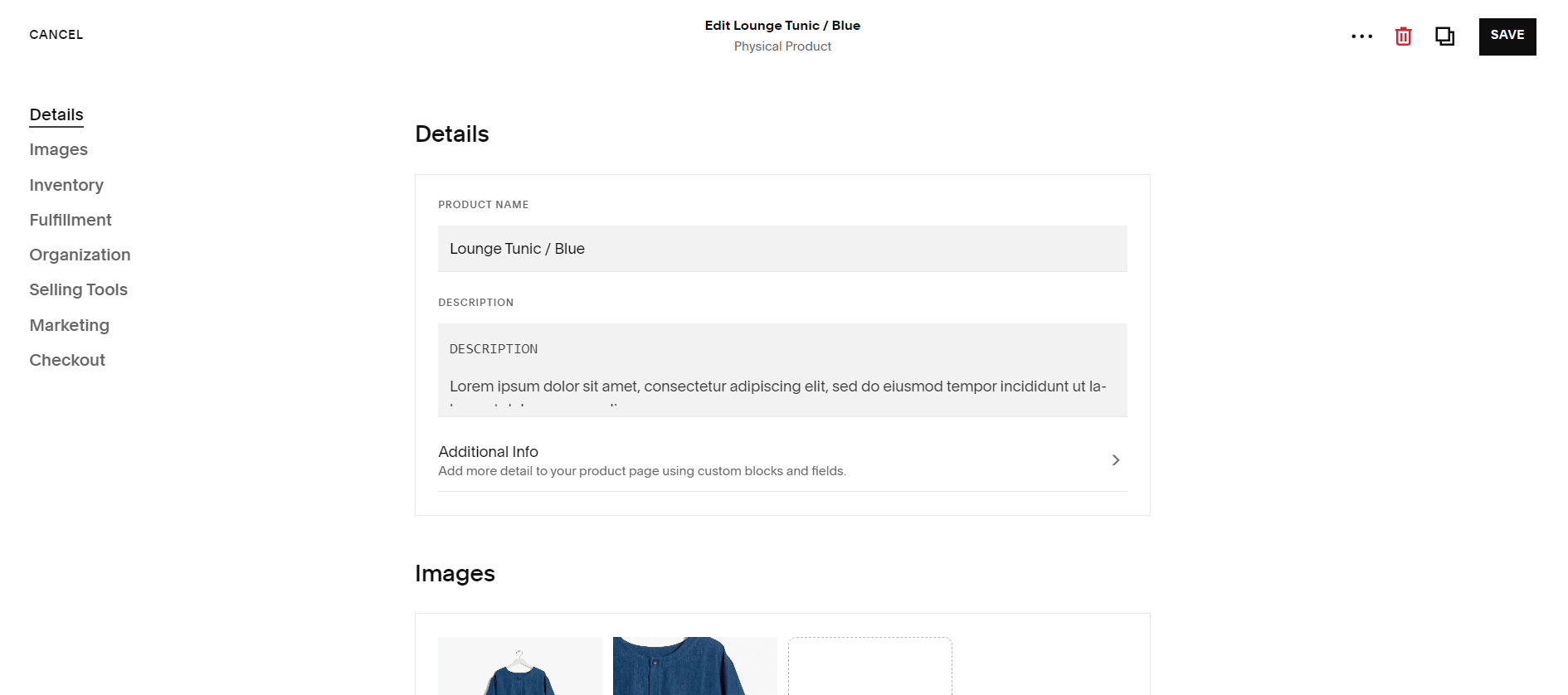
Ecommerce themes & templates
Shopify offers about 150 modern responsive themes for creating a virtual storefront, ensuring a good look on both desktop and mobile devices. While some themes are free, others cost between $170 to $380. Squarespace, on the other hand, provides a diverse selection of around 50 ecommerce templates, catering to various industries like fashion, beauty, home goods, and technology. These templates range from clean and minimalist to bold and colorful, accommodating different brand aesthetics and product types.
Product page customization
Shopify has a limit of three options per product, totaling 100 unique variations. This limit may not pose a significant constraint, and it is suggested that for products with numerous options, creating separate listings on Shopify can be a more manageable approach. Squarespace offers options for layout, design, and interactive elements on product pages. It enhances engagement with features like customizable buttons, wishlists, comparisons, reviews, and related products. However, its free templates have fewer customization options than premium ones.
Payment processing
Shopify offers payments with typical charges of 2.9% + 30¢ per online transaction on basic plans, and lower fees for higher-tier plans. However, it adds extra fees for using other payment gateways. Squarespace provides flexible payment processing for online stores with integrated gateways like Stripe and PayPal. Transaction fees may apply depending on the plan and payment method. Additional features include payment links, support for subscriptions, and the ability to accept international payments in various currencies.
Website Editors
Website EditorsEvaluates the platforms’ website building and editing capabilities.Score Components:
- Customization tools (40%): Range and power of editing features.
- Editor usability (30%): User experience within the editor.
- Design flexibility (20%): Freedom in layout and design changes.
- Update and maintenance ease (10%): Simplicity of updating and maintaining the site.
 7.9
7.9
 8.3
8.3
🏆
Winner: Squarespace
. Squarespace, with a score of 8.3, offers a user-friendly editor that allows easy drag-and-drop website creation without coding. With visually appealing templates and customization options, it caters to beginners and pros alike. The real-time editing experience ensures instant previews. Prioritizing content, it’s mobile-responsive and offers functional features like forms, social media integration, and online stores. Squarespace seamlessly integrates with tools for extended capabilities.
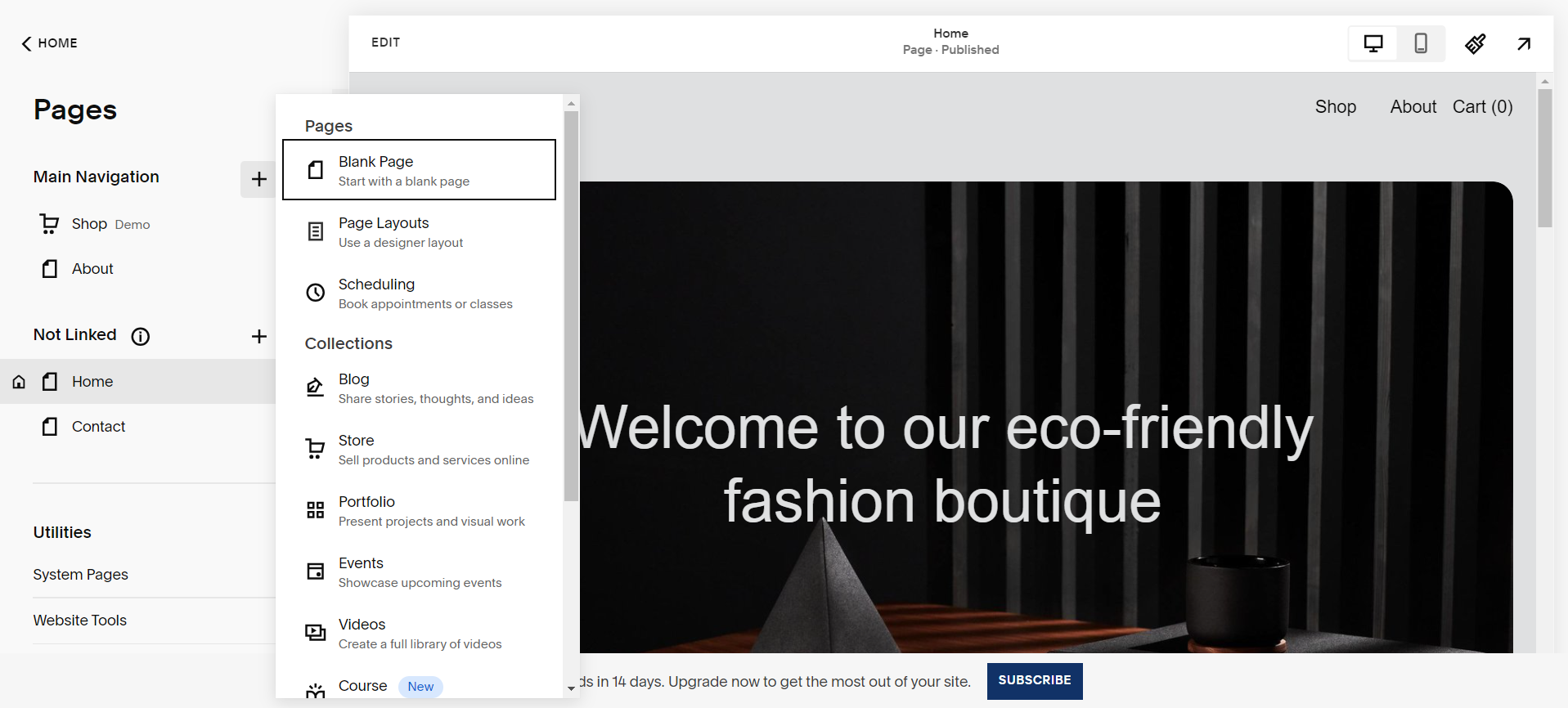
Shopify’s editor, scoring 7.9, excels in providing a streamlined, ecommerce-focused editing experience. It’s particularly beneficial for users who prioritize efficient management of online stores. The editor is straightforward, making it easy to add products, manage inventory, and set up payment methods. While it may not offer the same level of design flexibility as Squarespace, Shopify’s editor is optimized for sales and business growth, with built-in tools specifically designed for ecommerce businesses.
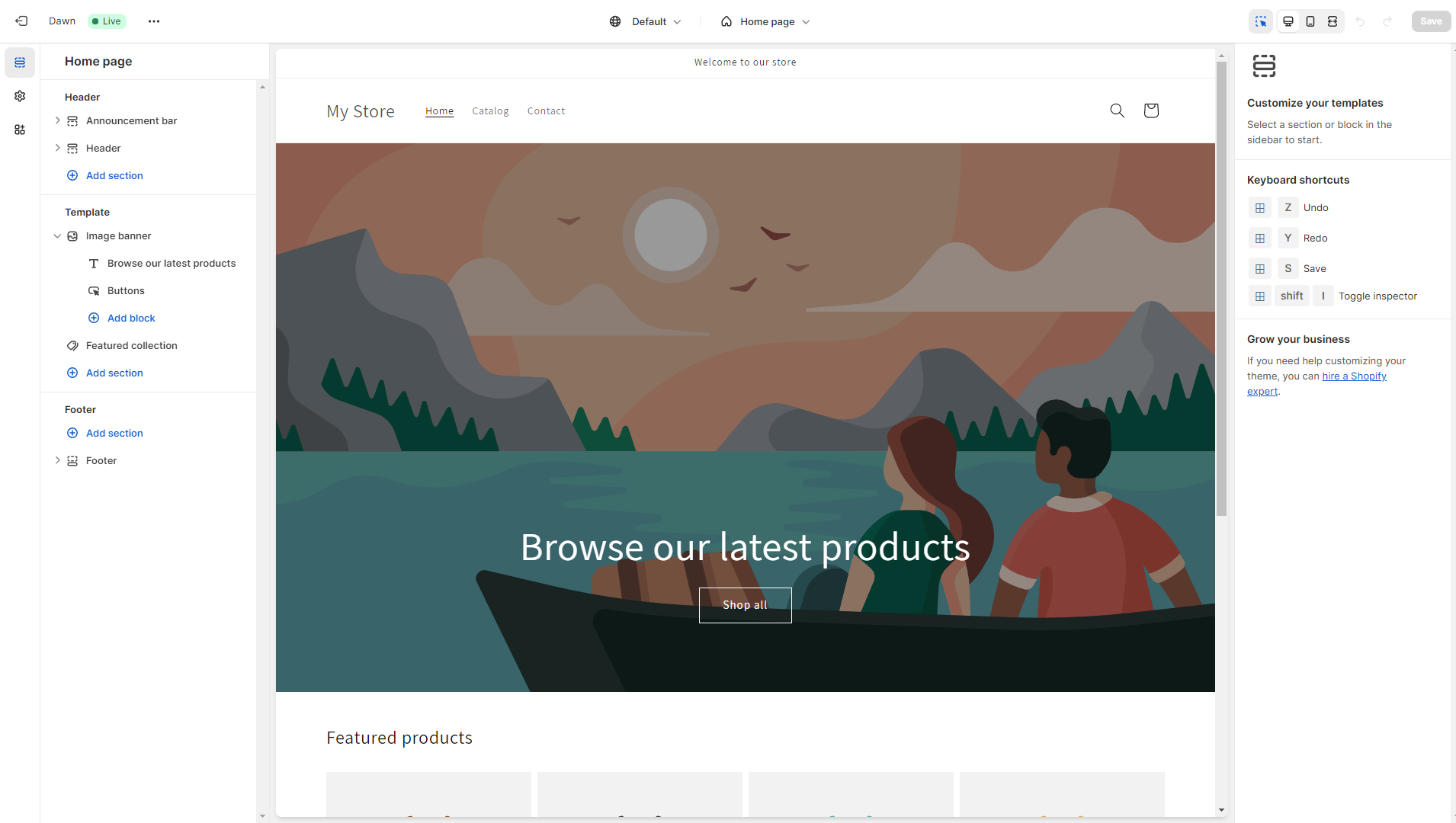
Mobile editor/app
 8.0
8.0
 8.5
8.5
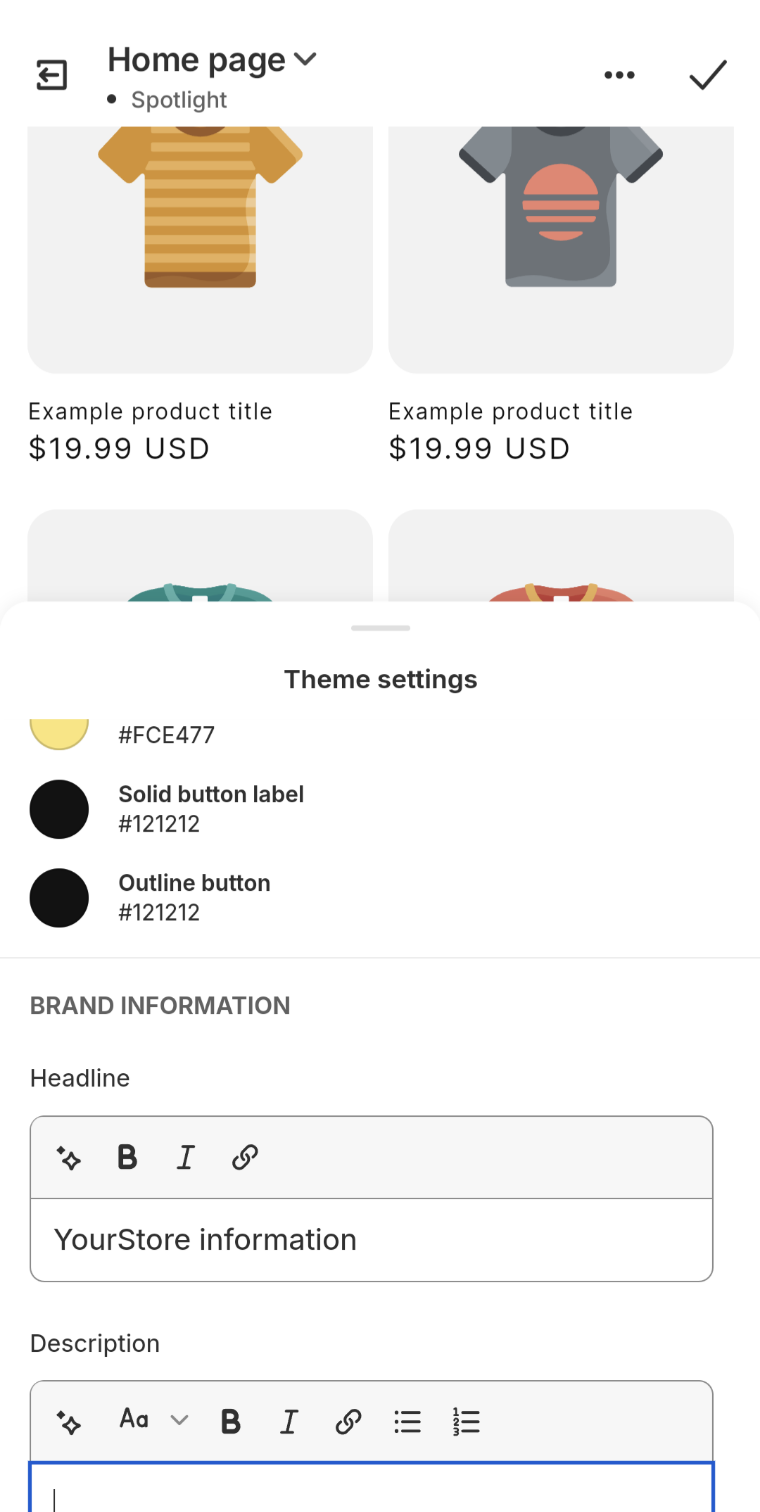
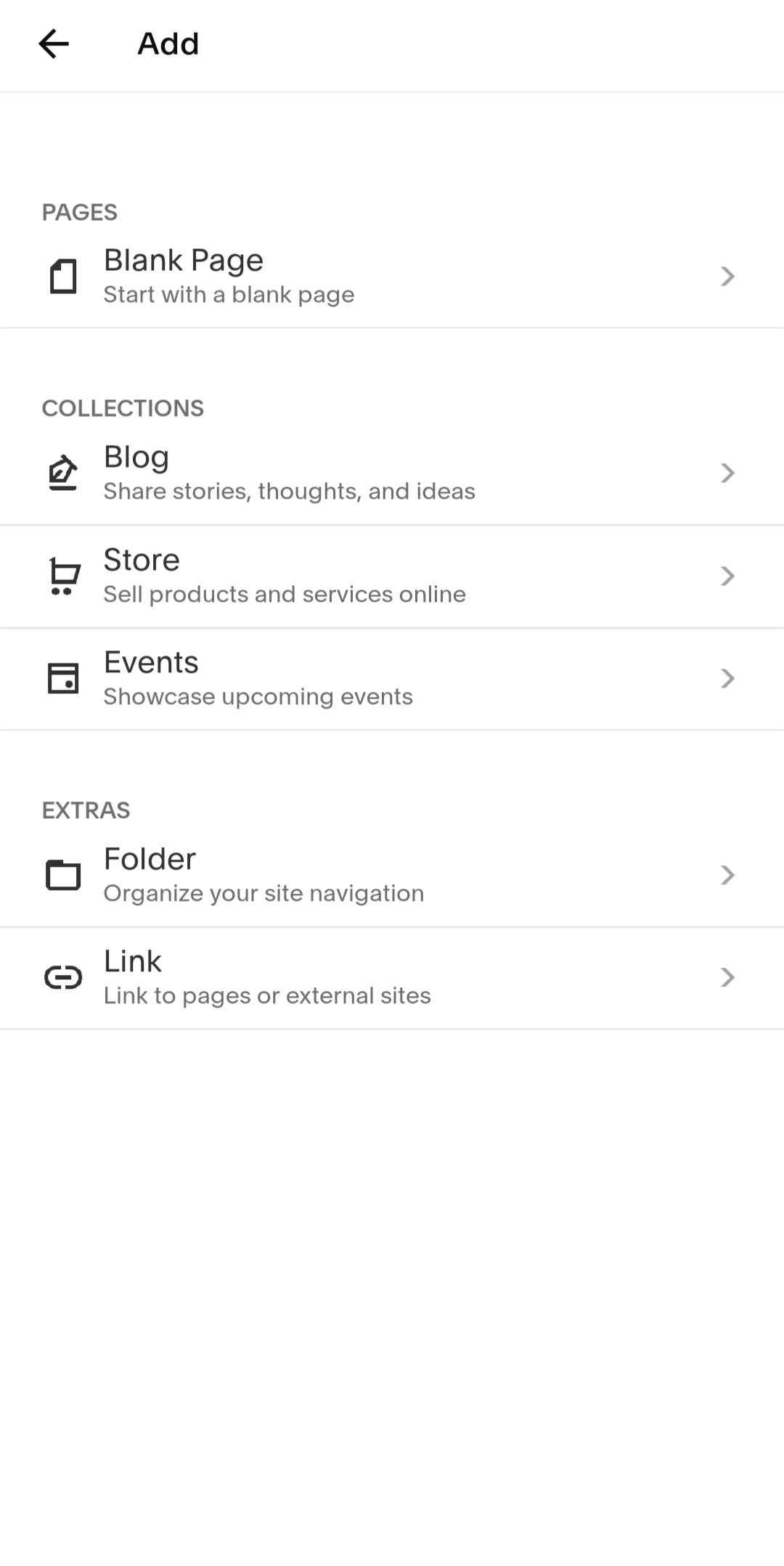
🏆
Winner: Squarespace
. Both Shopify and Squarespace offer mobile apps for managing your website, but they cater to different needs and skill levels. Shopify’s mobile app is more focused on ecommerce, allowing users to manage their online stores directly from their mobile devices. This includes adding, removing, editing, and rearranging content on the store’s website, offering convenient on-the-go adjustments to the store’s appearance and layout.
Squarespace, on the other hand, offers a broader range of features through its mobile app. Users can edit content, view website analytics, manage their online store, and schedule social media posts. However, it’s worth noting that some complex tasks such as advanced design customization or creating new page layouts require access to the desktop editor, as the app doesn’t offer the full range of functionalities available on desktop.
In summary, Squarespace receives a slightly higher rating due to its broader range of features and user-friendly interface, while Shopify’s strength lies in its robust ecommerce management features.
Product testing options
Product Testing OptionsAssesses the options for trying out platform features before commitment.Score Components:
- Trial quality (40%): Extent and usefulness of the trial or free version.
- Feature accessibility (30%): How many features are available to test.
- Trial duration (20%): Length of the trial period.
- Ease of transition (10%): Smoothness of moving from trial to paid plans.
 8.1
8.1
 7.4
7.4
Overall Result
:
Shopify Wins
. Shopify scores 8.1, offering the benefit of testing all features, including premium ones, during its 14-day free trial. Squarespace, scoring 7.4, also provides a 14-day free trial, but with limitations on testing some premium features such as custom code, premium integrations, and removal of Squarespace branding.

|

|
|
|---|---|---|
|
Free Plan |
No (14-day free trial) | No (14-day free trial) |
|
Trial Duration |
14 days | 14 days |
|
Testing Premium Features |
All features during free trial |
Limited, excluding some premium features |
Price
PriceLooks at the cost-effectiveness and value for money of each platform.Score Components:
- Plan value (40%): What each pricing tier offers.
- Transparency and clarity (30%): Clearness of pricing structures.
- Flexibility of plans (20%): Range of options to suit different budgets.
- Hidden costs (10%): Additional expenses not included in the plan.
 8.2
8.2
 8.4
8.4
Shopify and Squarespace both offer competitive pricing, but Squarespace has a slight edge in terms of value for money.

|

|
|
|---|---|---|
|
$10-$15 |
No offering at this amount. |
Personal ($12/month): Build a basic website with limited features for personal use. Access to basic templates, mobile-friendly design, and some social media integrations. Value for price: 5.0 |
|
$15-$20 |
No offering at this amount. |
Business ($16/month): Upgrade features with custom domain, SEO tools, marketing tools like email campaigns, and analytics. Value for price: 6.5 |
|
$20-$30 |
Shopify Basic ($29/month): Unlimited products, 2.9% + 30¢ card fee with Shopify payments, Extra 2% gateway fee without Shopify Payments, Abandoned cart recovery, Automated sales tax, Digital products, POS Integration, 2 staff accounts. Value for price: 8.0 |
Commerce ($26/month): Perfect for online stores with built-in eCommerce functionality (unlimited products), secure checkout, inventory management, and marketing tools. Value for price: 8.0 |
|
$40-$80 |
Shopify Standard ($79/month): Lower card fees (2.6% + 30¢), Gift cards, Professional reports, 5 staff accounts. Value for price: 8.5 |
Advanced Commerce ($40/month): Cater to high-volume stores with advanced eCommerce features like abandoned cart recovery, product subscriptions, gift cards, and real-time shipping quotes. Value for price: 9.0 |
|
$200+ |
Advanced Shopify ($299/month): Lowest card fees (2.49% + 30¢), Advanced report builder, Real-time carrier shipping, Up to 15 staff accounts Value for price: 8.8 |
No offering at this amount. |
Hosting quality
Hosting
qualityExamines the reliability and performance of the hosting solutions.Score Components:
- Uptime (40%): Consistency and reliability of website availability.
- Speed (30%): Loading times and performance.
- Bandwidth and storage (20%): Sufficiency of resources provided.
- Data centers (10%): Quality and distribution of hosting infrastructure.
 9.0
9.0
 7.6
7.6
Winner: Shopify
. Shopify outperforms Squarespace in hosting quality, with a 99.99% uptime guarantee and five global data centers. While Squarespace also offers proprietary cloud-based hosting and a 99.9% uptime guarantee, its hosting quality score is lower than Shopify’s.

|

|
|
|---|---|---|
|
Do they offer hosting? |
Yes, included in all of their plans |
Yes, included in all of their plans |
|
Data Centers: |
5 globally: USA (Ashburn, Virginia; Santa Clara, California), Canada (Toronto, Ontario), Ireland (Dublin), and Singapore |
Squarespace’s data centers are strategically scattered across North America, Europe, and Asia |
|
Type of hosting: |
Proprietary cloud-based hosting |
Proprietary cloud-based hosting |
|
Uptime: |
99.99% |
99.9% |
|
Uptime Guarantee: |
Yes |
Yes |
Website Speed Optimization
Website Speed OptimizationEvaluates optimization of website loading timesScore Components:
- PageSpeed Score (30%): Google’s score indicating performance optimization.
- Loading Time (30%): The average time until a website is fully interactive.
- Mobile Optimization (15%): Optimization effectiveness for mobile devices.
- Resource Optimization (15%): Optimizing images, scripts, and other heavy resources.
- CDN Usage (10%): Use of CDN to enhance speed across geolocations.
 7.8
7.8
 6.7
6.7
🏆 Winner: Shopify
Both Shopify and Squarespace prioritize website performance and page speed, but Shopify’s score of 7.8 outperforms Squarespace’s 6.7 in website speed optimization.

|

|
|
|---|---|---|
|
Focus |
App optimization, Google AMP |
Responsive design, image optimization |
|
Performance Tools |
Google Lighthouse, PageSpeed Insights |
Google PageSpeed Insights Integration |
|
Key Strategies |
App efficiency, Theme optimization |
Responsive design, image optimization, CDN, code minification, lazy loading of images |
|
Load Times |
Varies widely, dependent on optimization |
0.7s to 9.1s (Average: 2.9s) |
|
Page Speed Scores Range |
Scores vary; influenced by apps, images |
20/100 to 93/100 (Average: 62.7/100) |
|
Core Web Vitals Improvement |
Emphasis on LCP, FID, CLS improvements |
Emphasis on LCP, FID, CLS improvements |
Shopify’s approach to enhancing site speed includes app optimization by removing unneeded app code, conditionally loading apps, avoiding immediate pop-up displays, and incorporating app functionality directly into themes. This approach leverages Shopify’s fast servers and CDN network to boost load speed. Shopify also suggests utilizing Google AMP for faster mobile page loads, although with some design compromises. Analysis of three Shopify sites showed a range of Shopify speed scores from 14 to 75, Google PSI scores from 8 to 80, and load times varying from 10.6 seconds to 2.3 seconds. Continuous maintenance and optimization are essential for keeping Shopify stores fast.
Squarespace, on the other hand, focuses on responsive design, image optimization, CDN, code minification, and lazy loading of images to enhance website speed. Real-world performance analysis of Squarespace websites showed a wide range of page speed scores from 20/100 to 93/100, averaging 62.7/100, with the Largest Contentful Paint an important metric for website loading, ranged from 0.7 seconds to 9.1 seconds, with an average of 2.9 seconds. Squarespace also emphasizes on improving Core Web Vitals (CWV) scores, particularly LCP, FID, and CLS.
Get a head start on website creation with AI
Create a custom website tailored to your business needs 10X faster with 10Web AI Website Builder!
Plugins and integrations
Plugins and integrationsMeasures the range and effectiveness of additional plugins and integrations.Score Components:
- Variety of options (40%): Range of available add-ons.
- Integration smoothness (30%): Ease of integrating plugins into the site.
- Quality of plugins (20%): Functionality and reliability of the options.
- Custom integration capabilities (10%): Support for custom or third-party integrations.
 8.7
8.7
 6.8
6.8
🏆 Winner: Shopify.
With a score of 8.7, Shopify outperforms Squarespace, which scores 6.8. Shopify offers over 8,000 apps in its App Store, covering a wide range of functionalities. These apps come with various pricing options, including free, paid, freemium, and one-time payment models. On the other hand, Squarespace lacks an official app store but supports integrations and extensions through custom code injection and third-party tools. While the exact number of third-party plugins is challenging to determine, estimates suggest a diverse range catering to various needs, from SEO to booking systems. Despite the lower score, Squarespace’s integrations and extensions can still meet the needs of many users.
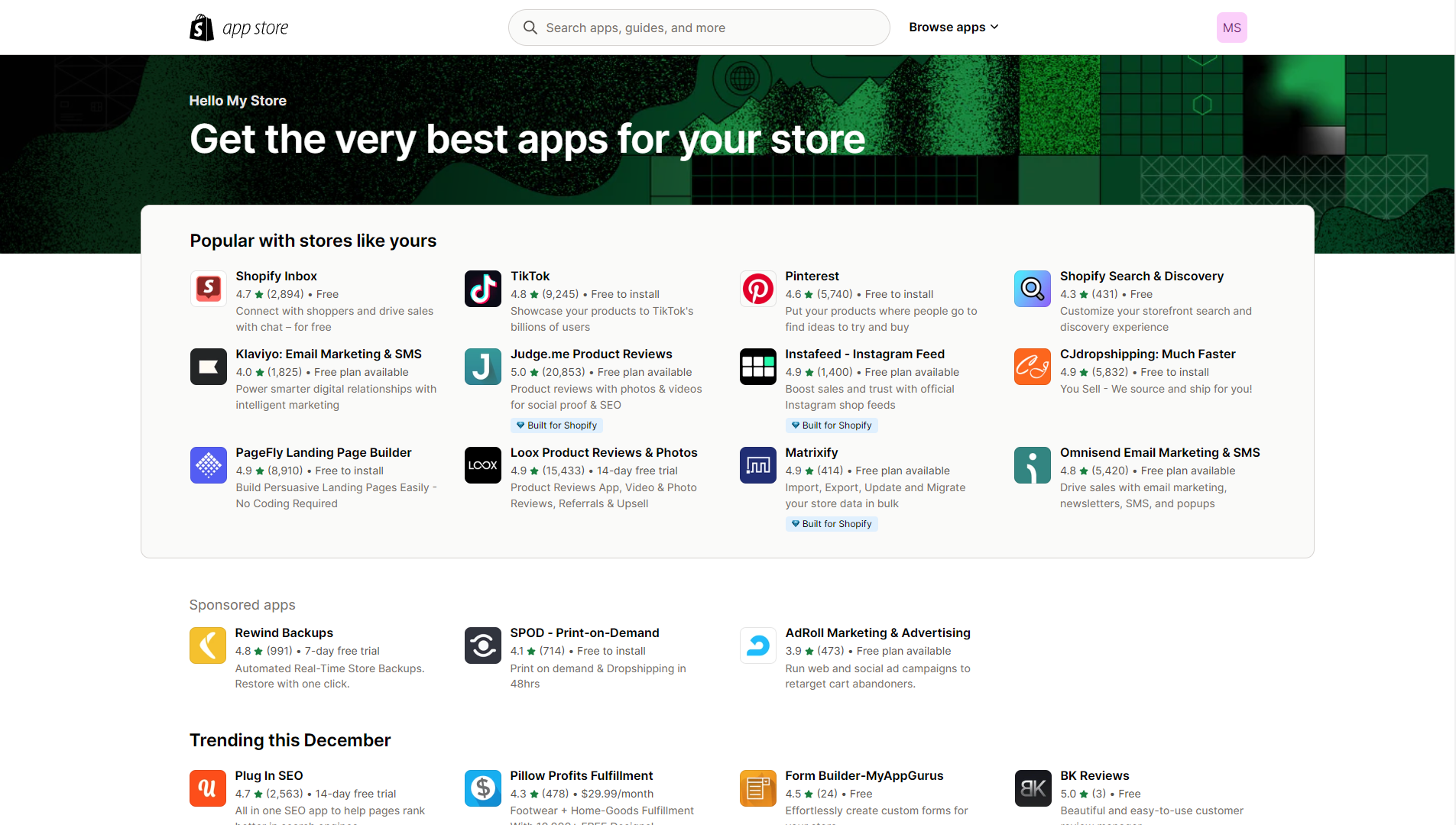
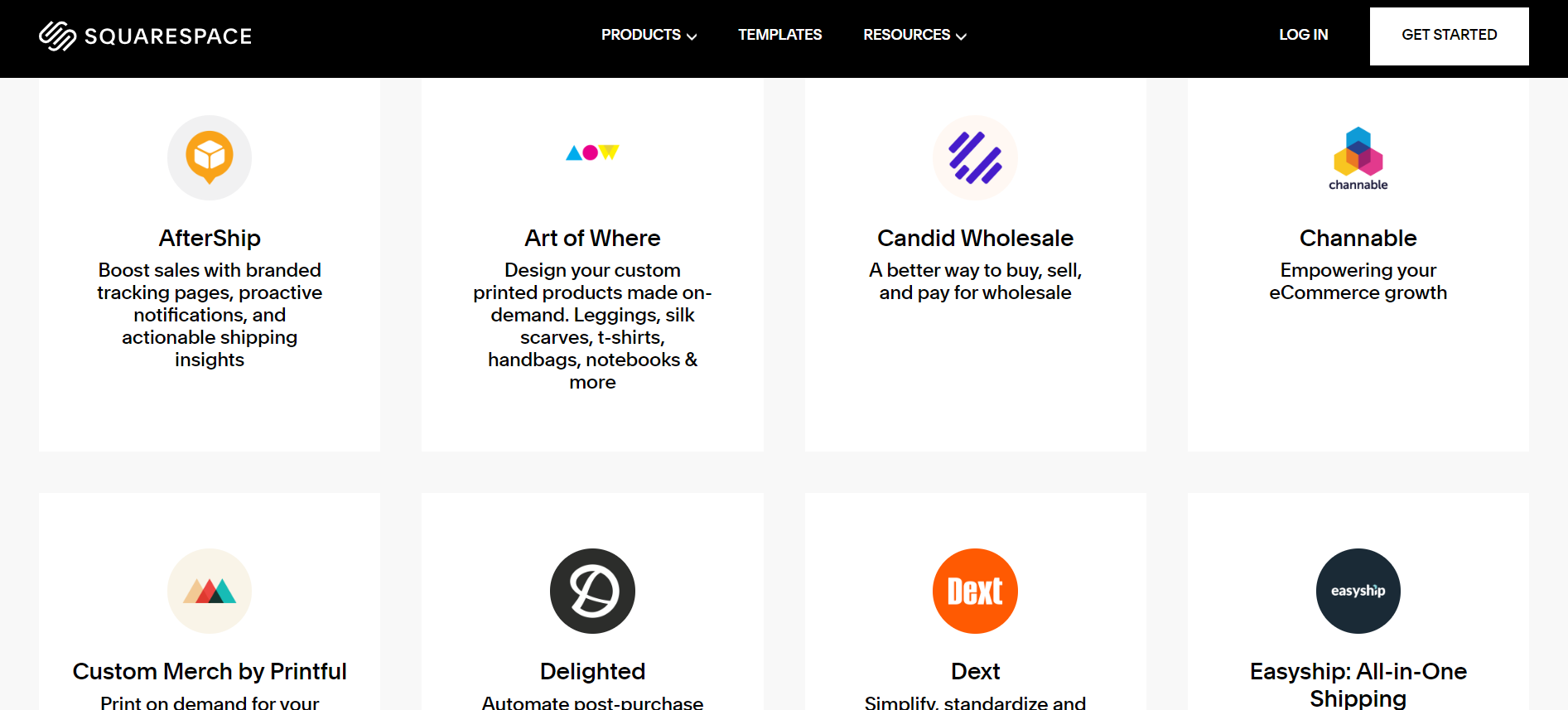
Marketing Features
Marketing featuresAssesses tools and options available for marketing.Score Components:
- SEO tools (40%): Effectiveness of SEO features.
- Marketing automation (30%): Availability and quality of marketing tools.
- Social Media integration (20%): Ease and depth of social media connectivity.
- Email marketing (10%): Quality and usability of email marketing tools.
 8.8
8.8
 8.1
8.1
🏆
Overall Winner: Shopify
. Shopify stands out for its more advanced ecommerce-focused marketing tools, especially in analytics and ad campaign management. Squarespace is strong in email marketing and blogging, but lacks an internal ad platform.

|

|
|
|---|---|---|
|
SEO Tools |
|
|
|
Email Marketing |
|
|
|
Blogging |
|
|
|
Social Media Integration |
Advanced integration for selling directly on social platforms |
Direct linking and selling on social platforms, plus feed displays on-site |
|
Analytics and Reporting |
Detailed analytics for in-depth insights |
Detailed insights into website performance and visitor behavior |
|
Ads and Promotions |
Google Ads integration; sophisticated ad campaign management |
Integration with Google Ads and tools for managing sophisticated ad campaigns |
Customer Support
Customer supportEvaluates the quality and availability of support options.Score Components:
- Response time (40%): Speed of support responses.
- Support quality (30%): Effectiveness and helpfulness of the support.
- Availability (20%): Range of support channels (phone, chat, email).
- Resource richness (10%): Quality of self-help and educational materials.
 8.6
8.6
 7.8
7.8
🏆 Winner: Shopify
. Shopify outperforms Squarespace in this category with a customer support score of 8.6 compared to Squarespace’s 7.8. Shopify provides 24/7 support through chat, email, and phone, and the tutorials are typically clear and beneficial. The extensive community ensures that answers can be found in the numerous forum threads. Additionally, Shopify’s outstanding marketing blog offers valuable information on business growth strategies.
Squarespace provides various customer support options, including live chat, email, a community forum, and a comprehensive help center. However, live chat and phone support operate only on weekdays from 6 AM to 6 PM PST, while email support is available 24/7. The community forum and help center offer 24/7 access, and language support is provided in several languages across different support channels.
Security
SecurityLooks at the platforms’ security measures and data protection.Score Components:
- Data protection (40%): Safeguards for user and customer data.
- SSL and encryption (30%): Implementation of secure connections.
- Compliance (20%): Adherence to industry security standards.
- Regular updates (10%): Frequency of security updates and patches.
 9.0
9.0
 8.8
8.8
🏆
Winner: Shopify
. Shopify’s security measures are slightly more comprehensive than Squarespace’s, earning it a higher security score. Shopify prioritizes data privacy and security through rigorous measures, including secure infrastructure, encryption, and limited access. They comply with data privacy regulations, practice data minimization, and ensure user control and transparency. Additional security measures include two-factor authentication, regular audits, and a dedicated incident response team.
Squarespace also prioritizes data privacy and security, offering secure server storage, encryption, strict access controls, compliance with regulations such as GDPR and CCPA, transparent privacy policies, and additional security measures like vulnerability scanning and malware detection. However, it falls slightly short of Shopify’s security score, making Shopify the winner in this category.
AI Capabilities
AI capabilitiesMeasures the effectiveness of AI-driven features and tools.Score Components:
- Automation efficiency (40%): Impact of AI on streamlining processes.
- Personalization (30%): AI-driven customization for users or customers.
- AI-Assisted design (20%): Role of AI in website design and functionality.
- Data analysis (10%): Use of AI in interpreting user data and analytics.
 7.9
7.9
 7.5
7.5

|

|
|
|---|---|---|
|
Personalized Design |
|
|
|
SEO Optimization |
AI-driven recommendations for better search engine visibility |
AI-guided SEO advice for optimal content placement and structure |
|
Customer Behavior Analysis |
Advanced analytics to understand customer preferences |
|
|
Sales Predictions |
AI-powered sales forecasting tools |
|
|
Inventory Management |
AI tools to assist in efficient inventory handling |
|
|
Content Generation |
AI assistance in creating and optimizing site content |
AI assistance in creating and optimizing site content |
🏆 Winner: Shopify
. Shopify, with a score of 7.9, utilizes AI mainly to enhance the ecommerce experience. Its AI features focus on customer behavior analysis, personalized shopping experiences, inventory management, and sales predictions. While Shopify’s AI is powerful, it is more business and data-centric compared to Squarespace’s design-focused AI.
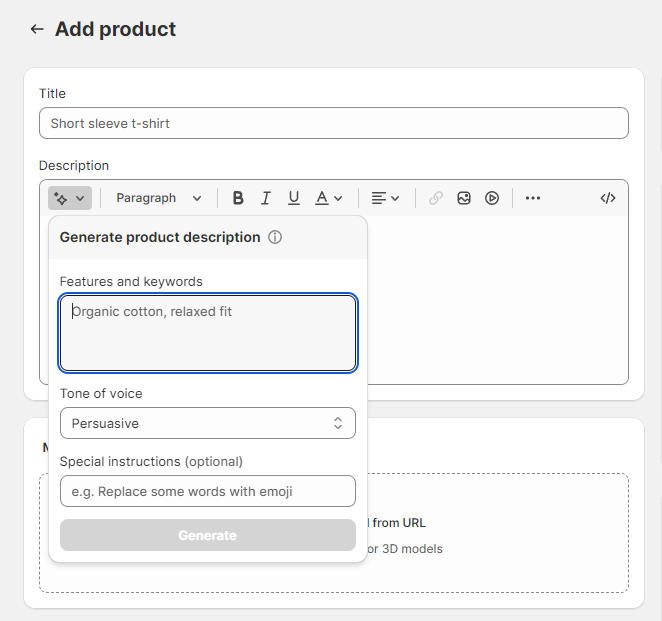
Squarespace, scoring 7.5, offers various AI-powered features to assist with website creation. It doesn’t currently have a fully automated AI website builder that generates your entire website from scratch based on your preferences. However, the available AI capabilities can significantly streamline the website building process and provide valuable assistance.
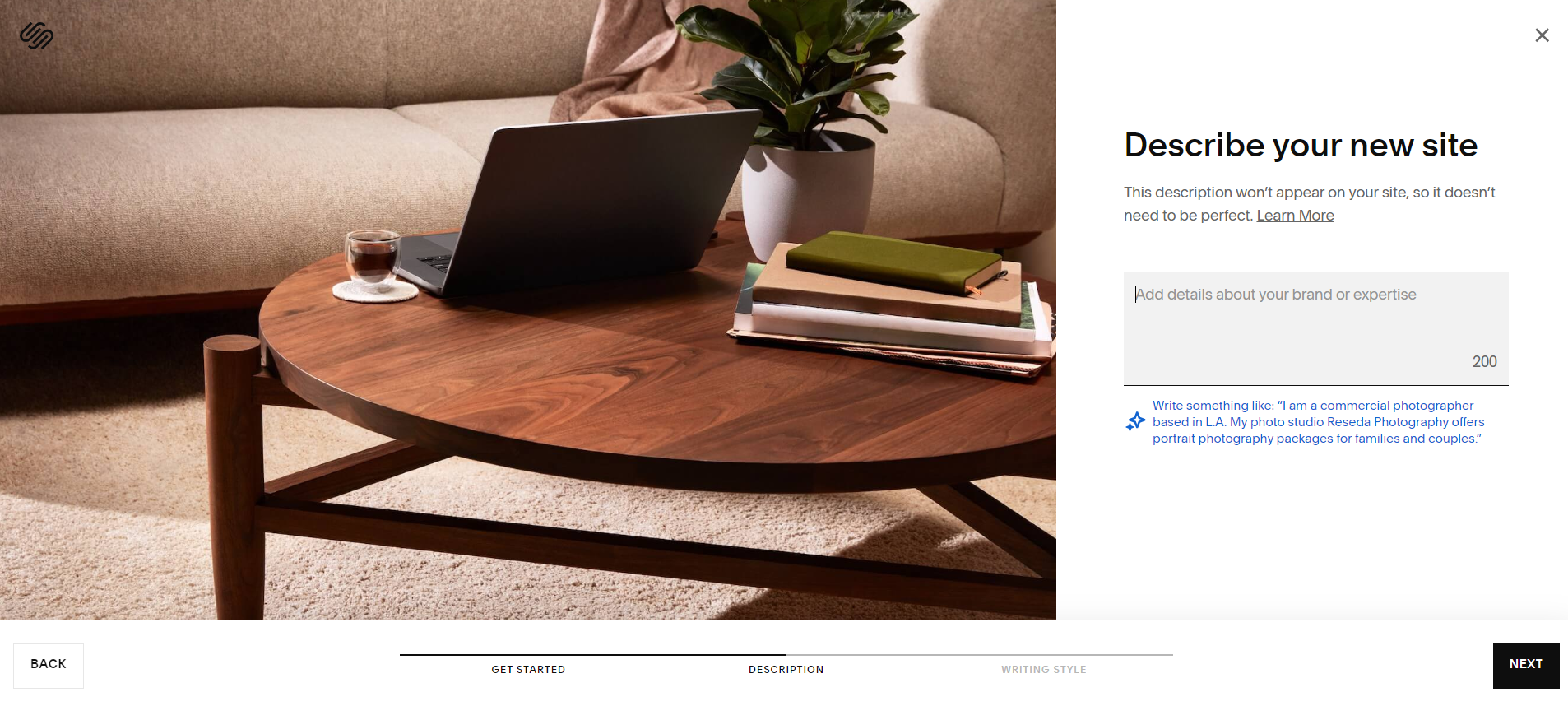
User Management
User ManagementAssesses the platforms’ capabilities in managing user roles, permissions, and accessibility.Score Components:
- Role Customization (40%): Flexibility in creating and defining user roles and
permissions. - Ease of Management (30%): User interface and tools for managing users.
- Access Control (20%): Effectiveness of access control measures for different user
levels. - Scalability (10%): Ability to manage a growing number of users efficiently.
 6.5
6.5
 7.4
7.4
🏆 Winner: Squarespace
. Managing your online team with Shopify and Squarespace involves different approaches to website editing access.
-
Shopify enforces staff account limits based on plans, ranging from 2 to 15, with Shopify Plus offering unlimited
accounts. Collaborators with limited access are also an option. - Squarespace’s number of users with editing access varies by plan. The Personal Plan allows one owner, Business and Commerce Plans permit 2 collaborators with different access levels, and the Enterprise Plan offers unlimited users, each with customizable access privileges, from full administrators to restricted contributors.
Shopify User Roles and Access Levels:
| Role | Description | Access Highlights |
|---|---|---|
| Store Owner | Full control over store | Manage products, orders, discounts, payments, apps, settings. Create and manage staff accounts. |
| Staff | Configurable access by owner |
Add/edit products, manage orders, fulfill orders, manage customers, update content. Access level can be customized by the owner. |
| Collaborator | Limited access for external partners | View and manage specific sections like blog or product categories. Cannot access full store settings. |
Squarespace User Roles and Access Levels:
| Role | Description | Access Highlights |
|---|---|---|
| Owner | The primary user who created the website and has full access. | Full site access, including billing, site settings, content editing, and member management. |
| Administrator | Users granted nearly full access to manage the site alongside the Owner. | Access to most areas except for some owner-specific settings like ownership transfer. |
| Content Editor | Users focused on adding and managing site content without full site access. | Can add, edit, and delete content on pages, blog posts, and manage comments. |
| Billing | Users who manage the subscription and billing details. | Access to billing information and the ability to update subscription details. |
| Store Manager | Users who manage the ecommerce aspects of the site. | Can manage inventory, fulfill orders, manage customers, and view sales analytics. |
| Custom | A role defined by the site owner or administrators with specific access. | Customizable access as defined by the Owner or Administrators, can vary widely between sites. |
Additional Features

|

|
|
|---|---|---|
|
SSL Certificate |
|
|
|
Custom Domain |
|
|
|
Free Custom Domain Included |
|
|
|
International Domains |
|
|
|
Mobile Responsive |
|
|
|
Page Speed |
|
|
|
Website Builder Mobile App |
|
|
|
Convert a Website To An App |
|
|
|
Website Analytics |
|
|
|
Multilingual Sites |
|
|
|
Multiple Users |
|
|
User Feedback
Shopify’s high rating on G2 Crowd can be largely attributed to its specialization in ecommerce. Its comprehensive features, ease of use, and robust customer support cater specifically to online businesses, leading to high user satisfaction among those seeking a dedicated ecommerce solution.
Squarespace, on the other hand, is well-liked for its easy-to-use interface and versatile tools, making it ideal for those who aren’t tech-savvy. It offers various features like website creation, SEO, online selling, and more, catering to different users. Customers appreciate its good customer support and visually appealing templates, creating a professional online presence. However, some users find issues with domain transfer/setup, limited customization options, and consider the pricing slightly higher. There are also occasional concerns about customer service and technical limitations like template rigidity and missing features. Despite these concerns, Squarespace still maintains a high rating on G2 Crowd, matching Shopify’s score.
The making of this blog
We followed a clear, step-by-step process to write and research this article.
FAQ
Which platform is better for ecommerce, Shopify or Squarespace?
Can I use Squarespace for a professional business website?
How do Shopify and Squarespace compare in terms of design and templates?
Which platform offers better customer support, Shopify or Squarespace?
Is Squarespace more affordable than Shopify?









